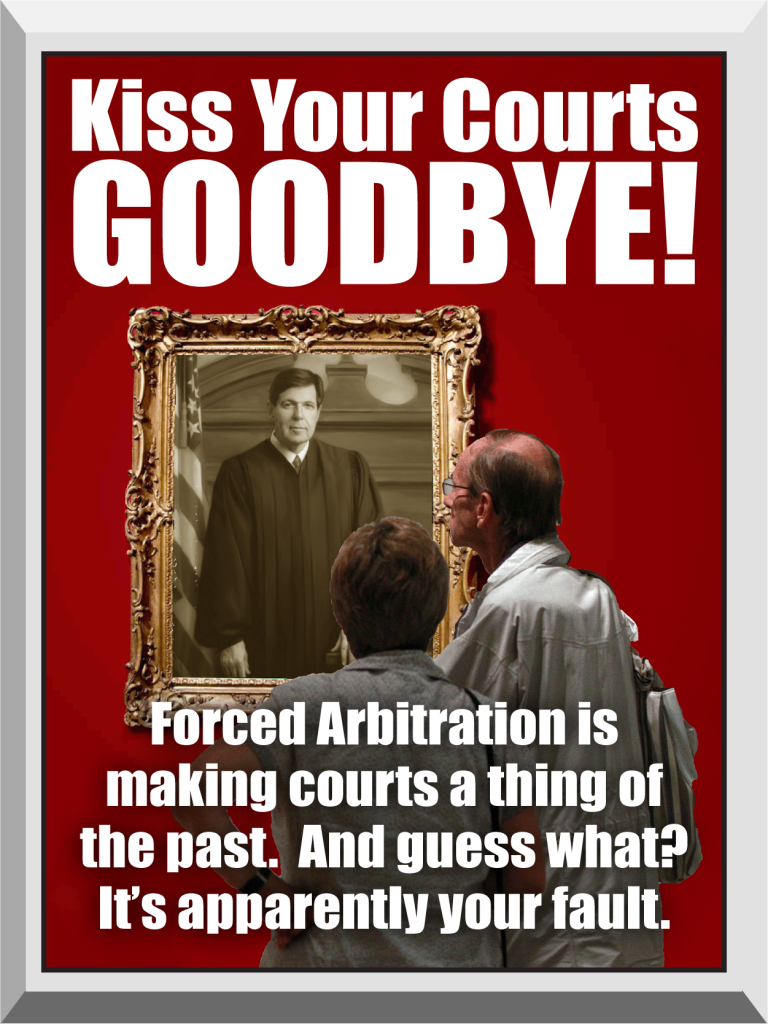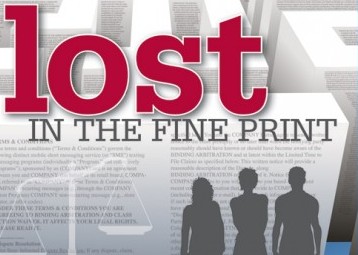
 Do you remember paragraph 14 of the User Agreement you accepted when you signed up for the Pickle-of-the-Month Club? No? Well, of course not, no one reads those things! But maybe we should. Nowadays, paragraph 14 contains an innocent-sounding clause that says disputes will be settled by arbitration instead of the courts. None of us takes that clause seriously but if you ever have a conflict with the company you could find yourself, not in a courtroom, but across the conference table from an arbitrator. This “neutral party” is most frequently a retired judge or corporate lawyer, and is routinely paid by the companies you’ll be fighting. Though arbitrators are theoretically guided by
Do you remember paragraph 14 of the User Agreement you accepted when you signed up for the Pickle-of-the-Month Club? No? Well, of course not, no one reads those things! But maybe we should. Nowadays, paragraph 14 contains an innocent-sounding clause that says disputes will be settled by arbitration instead of the courts. None of us takes that clause seriously but if you ever have a conflict with the company you could find yourself, not in a courtroom, but across the conference table from an arbitrator. This “neutral party” is most frequently a retired judge or corporate lawyer, and is routinely paid by the companies you’ll be fighting. Though arbitrators are theoretically guided by  the law they are not bound by it, and there is no appeal from an arbitrator’s decision…
the law they are not bound by it, and there is no appeal from an arbitrator’s decision…
Arbitration started as an inexpensive alternative to lawsuits between corporations, where it might have made sense as a neutral battleground between equals. But arbitration has exploded into pervasive use between companies and individuals, and the power dynamic is not the same at all. The company has all the power in this situation and you have no negotiating ability whatsoever. Sure, it’s a contract and you’re perfectly free to say no and take your business elsewhere, but if you do, say goodbye to your credit card, cellphone, cable, internet, online shopping, car rental, hospital care, and even your job. And already there may not be much “elsewhere” to take your business to… forced arbitration is used not just by a couple bad apples but by virtually every large company in virtually every industry with more smaller companies coming on board every day. And though it purports to be a neutral venue, one study found that 94% of rulings went against consumers.
Wise people might not waste their time just being angry about this; they might choose to band together with other people who have been similarly wronged and fight. Not so fast! Recent Supreme Court decisions make filing class action lawsuits difficult or impossible. It’s very much in a company’s interest to defraud thousands or even millions of customers of small amounts, yet it’s rarely worth an attorney’s time to take a case where an individual has lost a few tens or even a few thousands of dollars. In medical suits, class action suits allow groups who have been harmed by defective devices or drugs to retain experts or subpoena companies for information. Without class action these expenses must be borne by each individual, and information gained from one subpoena can’t be shared with other litigants.
One further “feature” of arbitration is that it can allow standards other than simply law to prevail. Many religious groups, and even non-religious companies, can and do require arbitration under “scriptural” standards. Well, at least until they lose. Some companies that have lost under scriptural arbitration turn have later turned to secular law to have their scriptural decisions overturned.
The standard of law isn’t ease, economics, or efficiency. The standard of law is justice. The Rule of Law doesn’t exist without a Court system, and “equal before the law” has no meaning if we cannot stand before the bar of law to be judged. Men and women around the world have fought and died for the Rule of Law and impartial courts with the ability to enforce that law. We think it’s infuriating to see those bloody gains flushed down the toilet of expediency to satisfy the avarice of mindless conglomerates. But we’ll see if you agree…
Arbitration Agreements, Q&A on WorkplaceFairness website, Nov 2000
What is arbitration?
What is forced arbitration?
Is arbitration bad?
(continues through 18 points)
Beware The Fine Print, 3-part Series, Jessica Naudziunas, Michael Corkery, and Poh Si Teng in the NY Times, Nov 2015
Part 1- “Beware The Fine Print” (Video)
Part 2- In Arbitration, a ‘Privatization of the Justice System’
Part 3- In Religious Arbitration, Scripture is the Rule of Law
Eliminating Forced Arbitration, Alliance for Justice website

Click here for Alliance for Justice’s video “Lost in the Fine Print“
Forced arbitration clauses routinely are inserted into the fine print of contracts that people must sign to buy a product or service or get a job. Spotify uses forced arbitration—a fact AFJ was prohibited from advertising on the service. Five of the largest banks in the country, PNC, Wells Fargo, JPMorgan Chase, Citigroup and US Bancorp, all use it. A recent petition signed by more than 100,000 consumers and activists called on them to end the practice. And many popular online services—Netflix, Instagram, Snapchat, and Amazon, for example—all use it as well. Under forced arbitration, individual consumers or employees must fight it out before a private arbitrator essentially chosen by the company that cheated or discriminated against them. Arbitrators do not need to be lawyers or follow precedent, yet their word is nearly always final and unappealable.
SCOTUSBlog Special Feature: Arbitration, Multiple authors on the SCOTUSBlog website
Mandatory Arbitration Stacks Deck Against Credit Cardholders, Data Show, Public Citizen website, Sep 2007
Consumers who seek justice in disputes with their credit card companies shouldn’t expect to find it in binding mandatory arbitration (BMA); in cases decided in California by a major arbitration firm over a four-year period, consumers lost 94 percent of the time, a new Public Citizen report shows. Further, virtually all were collection cases filed against consumers by credit card companies or firms that buy debts from these companies, indicating that credit card companies are using arbitration as a means to collect debts. The report, “The Arbitration Trap: How Credit Card Companies Ensnare Consumers,” was released at a press conference today with lawmakers who have introduced legislation to protect consumers from arbitration, and a victim of unfair arbitration proceedings.
Arbitration Everywhere, Stacking the Deck of Justice, Jessica Silver-Greenberg and Robert Gebeloff in the NY Times, Oct 2015
On Page 5 of a credit card contract used by American Express, beneath an explainer on interest rates and late fees, past the details about annual membership, is a clause that most customers probably miss. If cardholders have a problem with their account, American Express explains, the company “may elect to resolve any claim by individual arbitration.” Those nine words are at the center of a far-reaching power play orchestrated by American corporations, an investigation by The New York Times has found. By inserting individual arbitration clauses into a soaring number of consumer and employment contracts, companies like American Express devised a way to circumvent the courts and bar people from joining together in class-action lawsuits, realistically the only tool citizens have to fight illegal or deceitful business practices.
Thrown Out of Court, Lina Khan in Washington Monthly, Aug 2014
Late last year a massive data hack at Target exposed as many as 110 million consumers around the country to identity theft and fraud. As details of its lax computer security oversight came to light, customers whose passwords and credit card numbers had been stolen banded together to file dozens of class-action lawsuits against the mega-chain-store company. A judge presiding over a consolidated suit will now sort out how much damage was done and how much Target may owe the victims of its negligence. As the case proceeds, documents and testimony pertaining to how the breach occurred will become part of the public record.
All this may seem like an archetypal story of our times, combining corporate misconduct, cyber-crime, and high-stakes litigation. But for those who follow the cutting edge of corporate law, a central part of this saga is almost antiquarian: the part where Target must actually face its accusers in court and the public gets to know what went awry and whether justice gets done.
How Consumers Are Getting Screwed by Court-Enforced Arbitration, Herman Schwartz in The Nation, Jul 2014
For more than forty years, the Supreme Court’s conservatives have been engaged in a campaign to shut the courthouse door to consumers, working people, small businesses and others seeking redress for corporate wrongdoing. In recent years, and especially since Chief Justice John Roberts and Associate Justice Samuel Alito joined the Court, a major weapon in this campaign has been the Federal Arbitration Act (FAA) of 1925. The conservatives have used the act to prevent victims of such abuses from seeking redress in the courts, forcing them into pre-dispute arbitration instead. In doing so, they lose a public trial, a jury and a neutral judge, as well as an appeal to a higher court; in many cases they may also have to give up discovery rights. It is not uncommon for them to wind up before an arbitrator who is dependent upon the defendant’s business community for work and fees, and who may not even be legally trained. Not surprisingly, those forced into arbitration almost always fare much worse than they would in court.
A Cereal. A Rabbi. A Peppercorn., Richard Goldfarb on Food Liability Law, May 2014
What can you say about an internet contracting strategy that died? I’m referring, of course, to General Mills’ abortive attempt to include new terms of service on all its internet and social media products, including an agreement to arbitrate and to waive any right to a class action, that came and went so fast I couldn’t blog about it until it was over. If you’re on Facebook or Twitter, you probably had a friend, like I did, who tried to turn the tables on General Mills and posted some snarky “terms of service” for themselves. As you might guess, those aren’t enforceable. What about what General Mills did? Putting aside the market, especially the PR market, speaking quite loudly about it, to what extent might it have worked? That’s a critical question that involves not just contract law, but the Federal Arbitration Act and the Supremacy Clause of the U.S. Constitution, and it’s something on which the U.S. Supreme Court has a view that’s not too hard to discern. What I’ve tried to do is to analyze it in a more systematic way than simply piling on with conventional wisdom.
General Mills Says If You ‘Like’ Cheerios On Facebook, You Can No Longer Sue, Mike Masnick on TechDirt, Apr 2014
Three years ago when the Supreme Court ruled in AT&T Mobility v. Concepcion, basically allowing binding arbitration clauses in contracts to exclude class action suits, we noted that it was an unfortunate pitting of a broken class action system against a broken arbitration system. Both arbitration and class action lawsuits may have some good features — and the concepts behind each sound good, but both have been abused to extreme levels. On the class action side, often these lawsuits have little to do with righting wrongs, and very much to do with big paydays for lawyers (and some companies even turn class action lawsuits into marketing opportunities).
On the arbitration side, while the theory of having a neutral third party settle the dispute without having to go through an expensive litigation process certainly sounds good, the reality is quite different. Since arbitrators are hired, and large companies are frequent employers, arbitrators have very strong incentives to side with those companies, in order to make sure they’ll be hired in the future. When you have one party who is likely to be a frequent employer, and another who will only engage in the transaction once, guess where the bias is going to fall. And, indeed, multiple studies have shown that’s exactly what happens. In one case 94% of rulings went against consumers. Another study showed that companies that regularly use arbitration get higher awards.
The Evils of Binding Arbitration, Address to the Arkansas Trial Lawyers Assn, Nov 2000
Alabama first experienced the use of binding arbitration in our consumer contracts in late 1995. The first companies to include binding arbitration clauses were what we call the poverty industry – title pawnshops, check cashing outlets, and “catalog stores.” Across the state, many cases were filed against these type companies because of their deceptive sales tactics, fraud, and the usurious interest charged. As expected, these companies attempted to compel any and all cases to arbitration. Once the Republican majority led Alabama Supreme Court agreed that arbitration was the proper forum to resolve disputes against these companies, the door was flung open and the new “kudzu” took root and began spreading across our state creeping into every consumer contract imaginable. Now, binding arbitration is spreading into other states’ consumer contracts at a rampant pace.
A New Lochner Era, Jim Caton on Legal Reader, Feb 2016
Ever seen this? “Any dispute arising from the performance of this contract will be submitted to binding arbitration. Employee waives all rights to a trial in a court of law.” If you’ve gotten a job or a credit card in the last several years, you probably have seen this bit of legal bullying. And you’ve probably gone ahead and signed your rights away with the queasy feeling that you had no choice.
Supreme Court Justice Ruth Bader Ginsburg recently likened such ubiquitous clauses to the notorious case Lochner v. New York. In that 1905 case, known to every law student, the Supreme Court ruled that a New York state law restricting the hours per week bakers could work was unconstitutional because it violated bakers’ liberty to form contracts. Savor that. Imagine the low-wage laborer and his lawyer sitting down with a prospective employer to hash out the details of their employment contract. The absurdity of such a scene rises proportionally with unemployment statistics so that, here in 2016, the concept of “liberty of contract” seems like a bad joke more than a legal principle.
Signing an Arbitration Agreement With Your Employer, NoLo Law website
You may wonder why you should care where your claims get heard, as long as they are heard somewhere, whether in an arbitration proceeding or a court of law. An arbitration differs from a court case in several ways, and many of these differences work against employees.
Most important, an arbitration is heard and decided by an “arbitrator” — a private citizen (often a retired judge) who is paid by one or both sides to listen to the evidence and witnesses. That means you won’t have a jury hear your story — and juries are often sympathetic to employees.
In addition, the arbitration process limits the amount of information each side can get from the other. In employment cases, this generally hurts the employee, because the employer is usually the one in possession of most of the documents and information relating to the employee’s case.
Signing Away Our Rights, Katherine Stone in The American Prospect, Mar 2011
In 2007, Antonio Jackson, an African American worker at the Rent-a-Center store in Washoe County, Nevada, concluded that he had been repeatedly denied promotion to sales manager because of his race. He complained to his store manager, the corporate office, and the human-resource department, all to no avail. Instead he was suspended, then transferred to a less desirable location, and ultimately fired. Jackson sued for race discrimination, only to be told by his employer that he had forfeited his rights to appeal his case when he took the job.
Rent-a-Center required all employees to agree to compulsory arbitration. The waiver covered the right to sue not just for civil-rights violations but also for violations of other hard-won employee rights such as a minimum wage, overtime pay, rest breaks, parental leave, and disability rights as well as protection from workplace sex discrimination and sexual harassment.
Astonishingly, in 2010, the Supreme Court agreed with Rent-a-Center, holding that Jackson’s discrimination charge had to be resolved by arbitration — in a process created by the employer with no appeal to the courts. The Roberts Court’s recent arbitration rulings have only intensified a trend that dates back more than two decades, as the high court has chipped away at these and other legal rights, permitting ever broader use of compulsory arbitration.
Supreme Court’s Arbitration Ruling Is Another Blow To Consumer Rights, David Lazarus in LA Times, Dec 2015
The U.S. Supreme Court made clear this week that, regardless of what the Constitution says about a consumer’s right to sue, businesses are absolutely entitled to block people from banding together and taking a dispute to court. It was the court’s latest ruling in favor of arbitration, rather than class-action lawsuits, as a preferred method for resolving issues between companies and their customers — which is exactly how the business world wants it. Mandatory arbitration overwhelmingly favors business interests, consumer advocates say, and prevents people from closing ranks to challenge unfair fees and conditions.
Justice Ginsburg’s Warning To The American Worker, Ian Millhiser on ThinkProgress, Feb 2016
Lochner v. New York is one of the Supreme Court’s great anti-precedents. Typically taught in law schools as an example of how judges should not behave, Lochner rested on a fabricated “right to contract” that, in effect, gave employers broad license to exploit their workers. The so-called right invented in Lochner and similar cases later formed the basis for decisions striking down the minimum wage and laws protecting workers’ right to organize. Speaking at Brandeis University last Thursday, Justice Ruth Bader Ginsburg offered a warning that Lochner may not be as much of a relic of the past as it is often presented in legal textbooks.
“I was reminded of Lochner reading some decisions of the Court concerning workers, consumers, credit card holders who signed agreements saying “if you have a dispute with us, you can bring it only in arbitration — not in court — and you cannot use the class action device. You must sue for your individual claim, which might be 30 dollars, and that’s it.” And that has also been described as tied to liberty of contract.”
Have You Signed Away Your Right To Sue?, Stephanie Mencimer in Mother Jones, Apr 2008
Fonza Luke had worked as a nurse for Baptist Health System’s Princeton Medical Center in Birmingham, Alabama, for 26 years when the human resources department summoned her to a meeting about a new “dispute resolution program.” Nurses, housekeepers, and lab techs crammed into a conference room where hospital administrators presented a form and told them to sign. Signing meant agreeing to submit any future employment-related complaints to an arbitrator hired by the hospital and waiving the right to sue in court. Refusing to sign meant they’d be fired.
Luke had known the arbitration agreement was coming, and she didn’t like the idea one bit—”I just think it’s unfair to be made to do something like that,” she says. So before going to the conference room, she slipped away to a pay phone and called her lawyer. He said, “Don’t sign it. You’ll be signing your rights away,” she recalls. Luke turned in the form without a signature in quiet protest. A few weeks later, the hospital again ordered her to sign, and again she refused. Despite repeated threats, the hospital didn’t fire her, at least not then.
Three years later, Luke traveled to Atlanta for a continuing-education class recommended by her coworkers. When she returned, the hospital fired her for “insubordination” because she had been cleared to take just one day off, not two. For 30 years, Luke had been an exemplary employee. Her personnel file was full of praise for her performance; a review three weeks before the firing called her a “role model.” Many of the younger, white nurses Luke worked with had taken unapproved leave, she observed, and kept their jobs. So Luke filed a race and age discrimination complaint with the federal Equal Employment Opportunity Commission (EEOC), which conducted a lengthy investigation, upheld her complaint, and recommended that Luke file a civil rights suit in federal court, which she did in 2003.
This sounds hideous. Who’s on the other side?
Arbitration Clauses in Employment Disputes: Staying Out of Court, FindLaw website
The explosion in employment claims litigation highlights the need for employers in Hawaii to become more aggressive in avoiding the court system for resolution of employment disputes. Very few Hawaii employers have the financial ability to survive the recent decision of a jury in Iowa which awarded a victim of sex harassment $82 million.
Such astronomical awards are responsible for the meteoric rise in the use of mandatory private adjudication–or Alternative Dispute Resolution (“ADR”). Under ADR, the forum for dispute resolution is switched, by agreement between the employer and the employee, from the courtroom to a conference room. Instead of going before a judge and jury, the dispute is resolved by a neutral but experienced third party arbitrator, who is empowered to issue a binding and final decision.
Typically the agreement to arbitrate is entered into at the time of employment, well before any actual dispute has even arisen. Such pre-dispute agreements have proven to be the only effective means of reducing the ever-burgeoning litigation costs and the frustrating delays which plague our court system. Most employers embracing arbitration do so because ADR will give their employees workplace justice, through a system that is quick, fair, more predictable and not “out of control.”
Perhaps even more important, employers opt for arbitration to limit the cost of resolving marginal cases. With arbitration as an option, employers can afford to fight cases before an experienced arbitrator who knows the “law of the shop” and will not be unduly influenced by the “deep pockets” of the employer.










